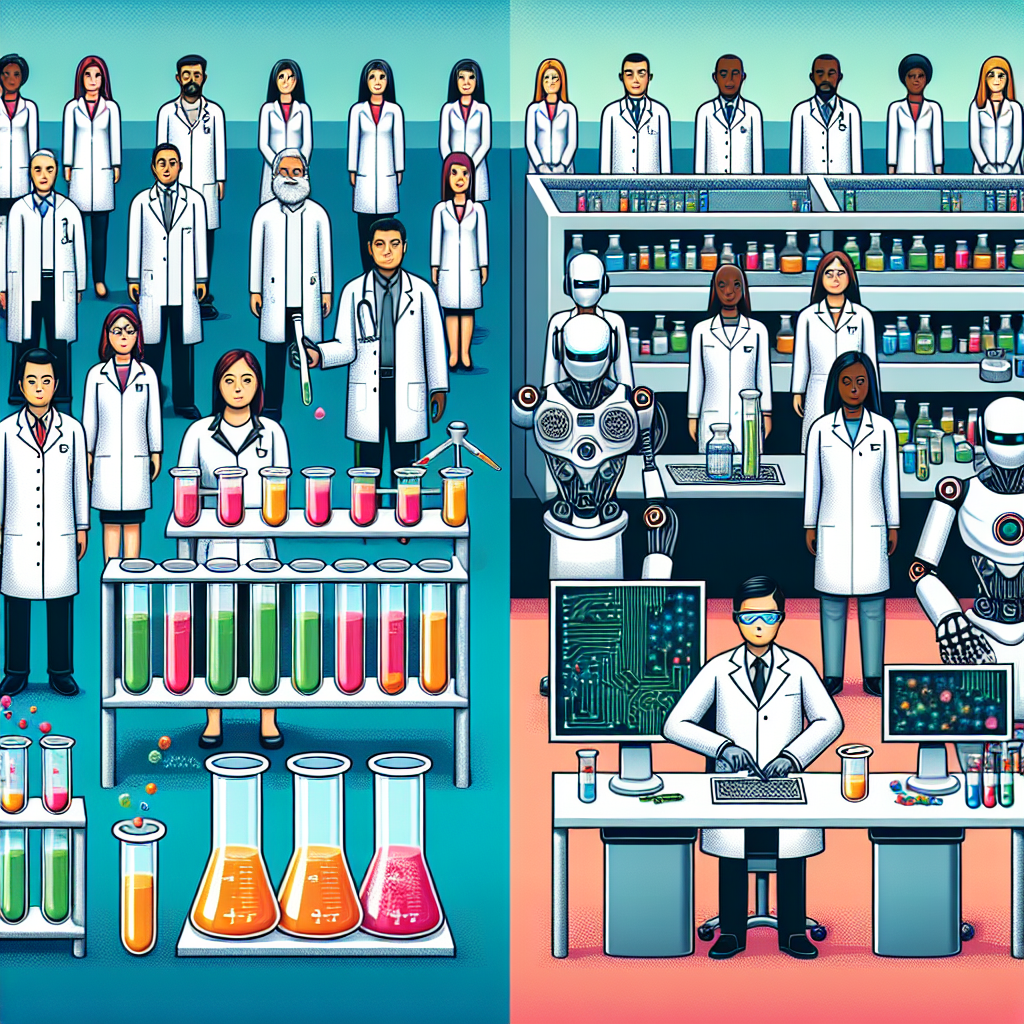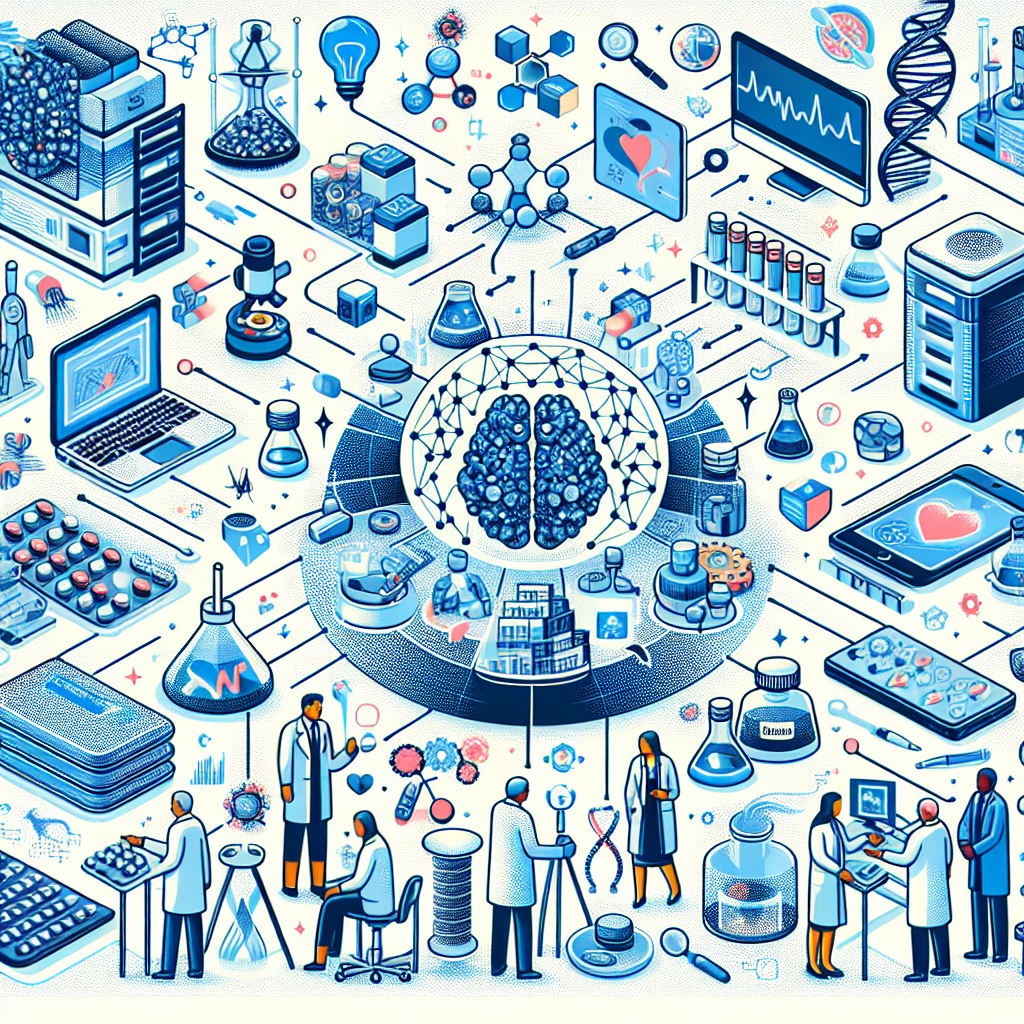How AI is Transforming the Pharma Industry

Discover how AI is revolutionizing the Pharma Industry! Learn about the latest advancements, the impact on drug discovery, personalized medicine, and much more. Don’t miss out on this technological revolution. Click here to explore more.
Exploring the Impact of AI on Drug Discovery in the Pharma Industry
Artificial Intelligence (AI) is revolutionizing various sectors, and the pharmaceutical industry is no exception. The advent of AI in the pharma industry is transforming the way drugs are discovered, developed, and distributed. This article explores the profound impact of AI on drug discovery in the pharma industry.
Drug discovery is a complex, time-consuming, and expensive process. It involves identifying target diseases, discovering potential drug candidates, testing these candidates for efficacy and safety, and finally, getting regulatory approval. Traditionally, this process could take up to 15 years and cost billions of dollars. However, AI is poised to disrupt this traditional model by accelerating the drug discovery process and reducing costs.
AI algorithms can analyze vast amounts of data faster and more accurately than humans. They can sift through millions of chemical structures, identify potential drug candidates, and predict their properties and effects. This not only speeds up the drug discovery process but also increases the chances of finding effective drugs. For instance, AI has been instrumental in the rapid development of COVID-19 vaccines. AI algorithms were used to analyze the virus’s genetic makeup and predict potential vaccine candidates, significantly reducing the time taken to develop the vaccines.
Moreover, AI can also help in identifying new uses for existing drugs. This process, known as drug repurposing, can save time and money as these drugs have already been tested for safety and efficacy. AI algorithms can analyze the chemical structures of existing drugs and their effects on various diseases, identifying potential new uses. For instance, AI has helped identify potential new uses for existing drugs in treating diseases like cancer and Alzheimer’s.
AI can also help in predicting the success of clinical trials. Clinical trials are a critical part of the drug discovery process, where potential drugs are tested on humans for efficacy and safety. However, many clinical trials fail, leading to wasted time and resources. AI can analyze data from previous clinical trials and predict the likelihood of success of new trials. This can help in making informed decisions and reducing the risk of failure.
Furthermore, AI can also help in personalizing medicine. Every individual responds differently to drugs due to genetic differences. AI can analyze genetic data and predict how individuals will respond to different drugs. This can help in developing personalized treatment plans, increasing the effectiveness of treatments, and reducing side effects.
In conclusion, AI is transforming the drug discovery process in the pharma industry. It is accelerating the process, reducing costs, identifying new uses for existing drugs, predicting the success of clinical trials, and personalizing medicine. However, the use of AI in drug discovery also raises ethical and regulatory issues that need to be addressed. For instance, there are concerns about data privacy and the reliability of AI predictions. Therefore, while AI holds great promise in transforming the pharma industry, it is essential to address these issues to fully realize its potential.
The Role of AI in Streamlining Clinical Trials in the Pharma Sector

Artificial Intelligence (AI) is revolutionizing various sectors, and the pharmaceutical industry is no exception. One of the most significant areas where AI is making a substantial impact is in streamlining clinical trials. Clinical trials are a critical component of the pharma sector, as they are instrumental in the development and approval of new drugs. However, they are also notoriously complex, time-consuming, and expensive. AI is now being leveraged to address these challenges and transform the way clinical trials are conducted.
AI’s role in streamlining clinical trials begins with patient recruitment. Traditionally, identifying suitable participants for clinical trials has been a laborious process, often resulting in delays. AI can expedite this process by using algorithms to analyze vast amounts of data and identify potential candidates based on specific criteria. This not only speeds up the recruitment process but also ensures a more accurate match, reducing the likelihood of dropouts and improving the overall quality of the trial.
Once the trial is underway, AI can also play a crucial role in monitoring patient adherence to the trial protocol. Non-adherence can significantly impact the validity of trial results, but monitoring adherence manually can be challenging. AI can help by using machine learning algorithms to analyze data from wearable devices or mobile apps, providing real-time insights into patient behavior. This allows for immediate intervention if non-adherence is detected, ensuring the integrity of the trial.
AI’s ability to analyze large volumes of data also comes into play in the detection of adverse events during clinical trials. Traditionally, these events are reported by patients or healthcare providers, but this relies on their ability to recognize and report them. AI can automate this process by continuously monitoring patient data and using predictive analytics to identify potential adverse events before they become serious. This not only improves patient safety but also provides valuable data that can inform future trials.
Moreover, AI can streamline the data analysis process. Clinical trials generate vast amounts of data, and analyzing this data manually can be time-consuming and prone to error. AI can automate this process, using machine learning algorithms to identify patterns and trends in the data. This not only speeds up the analysis process but also provides more accurate and reliable results.
Finally, AI can also play a role in the post-trial phase. Once a drug has been approved, it is essential to monitor its effectiveness and safety in the real world. AI can assist with this by analyzing real-world data, such as electronic health records and social media posts, to monitor the drug’s performance and identify any potential issues.
In conclusion, AI is playing a transformative role in streamlining clinical trials in the pharma sector. From patient recruitment to post-trial monitoring, AI is helping to make clinical trials faster, more efficient, and more reliable. As AI technology continues to evolve, its impact on the pharma industry is likely to grow, offering exciting possibilities for the future of drug development.
How AI is Revolutionizing Patient Care in the Pharmaceutical Industry
Artificial Intelligence (AI) is rapidly transforming various sectors, and the pharmaceutical industry is no exception. The advent of AI has brought about a revolution in patient care, significantly enhancing the efficiency and effectiveness of treatments. This article will delve into how AI is revolutionizing patient care in the pharmaceutical industry.
AI’s impact on patient care is profound, starting from the early stages of drug discovery to the final stages of patient monitoring. In the initial stages of drug discovery, AI algorithms can analyze vast amounts of data to identify potential drug candidates. This process, which traditionally takes years, can be significantly shortened with the help of AI, thereby accelerating the pace of new drug development.
Moreover, AI can predict how a drug will interact with the body based on the patient’s genetic makeup. This personalized approach to medicine, known as precision medicine, allows for treatments to be tailored to individual patients. It not only increases the effectiveness of treatments but also reduces the risk of adverse side effects.
AI is also transforming clinical trials, a critical phase in drug development. Traditionally, clinical trials are time-consuming and costly, with a high rate of failure. However, AI can improve the efficiency of clinical trials by identifying suitable candidates for trials based on their health data. This targeted approach can reduce the time and cost associated with clinical trials, and increase their success rate.
In addition to drug discovery and development, AI is revolutionizing patient monitoring. AI-powered wearable devices can continuously monitor patients’ health and provide real-time feedback. These devices can detect anomalies in the patient’s health data and alert healthcare providers, enabling early intervention. This proactive approach to patient care can prevent health issues from escalating and improve patient outcomes.
Furthermore, AI can assist in medication management, a critical aspect of patient care. AI can analyze a patient’s medication regimen and identify potential drug interactions or side effects. This can help healthcare providers to adjust the medication regimen as needed, ensuring the safety and effectiveness of treatments.
AI is also playing a pivotal role in improving patient adherence to medication. Non-adherence to medication is a significant issue in healthcare, leading to poor health outcomes and increased healthcare costs. AI can address this issue by sending reminders to patients to take their medication and providing personalized support to help them manage their health.
In conclusion, AI is revolutionizing patient care in the pharmaceutical industry. From accelerating drug discovery to improving patient monitoring, AI is enhancing the efficiency and effectiveness of treatments. Moreover, AI’s ability to personalize medicine and improve patient adherence to medication holds great promise for the future of healthcare. As AI continues to evolve, it is expected to bring about even more significant transformations in patient care. The pharmaceutical industry, therefore, needs to embrace AI and harness its potential to improve patient care.